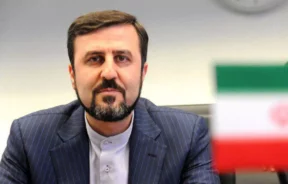Zarif’s Contributions and Missteps
WANA (Jan 26) – Mohammad Javad Zarif’s remarks, made during the Davos summit in his conversation with Fareed Zakaria, can be analyzed from three perspectives: accomplishments, costs, and potential motivations.
Starting with the positive side, his presence in such discussions reflects an opportunity for Iran’s public diplomacy. In the realm of international media, where few Iranian figures are recognized for defending Iran’s ideas, Zarif’s appearance fills a critical gap. Aside from individuals like Mohammad Marandi, who can engage in direct and challenging discussions with mainstream global media, there are almost no other options. Thus, Zarif’s involvement—despite its controversies—represents a rare asset for Iran’s international communication strategy.
The broader media representation of pro-Iranian perspectives through diverse figures with varying approaches but aligned with national interests is essential. It can gradually reduce Iran’s isolation in global narratives. However, such individuals must first possess strong arguments that resonate with international audiences and, secondly, avoid dragging internal political disputes into international dialogues.
Repercussions of #Javad_Zarif‘s Passive Remarks at the #Davos Summit:
1- Zarif participated in the summit without coordination with the President of #Iran and on his own initiative.
2- The content of Zarif’s remarks was not coordinated with any authority and contradicts Iran’s… pic.twitter.com/NUpbZB4uTJ
— WANA News Agency (@WANAIran) January 25, 2025
A second notable aspect of Zarif’s remarks pertains to his views on regional issues. His points regarding Israel’s leadership, Iran’s vision for better relations with its neighbors, and the country’s nuclear program often include logical and persuasive arguments. Yet, embedded within these statements, he also ventures into Iran’s domestic political arena, leading to unnecessary complications.
One of Zarif’s consistent mistakes appears to be the assumption that there is a wall separating international and domestic audiences. He seems to believe that what he tells non-Persian speakers will not be observed or have repercussions in Iran. This miscalculation has repeatedly led him to introduce internal partisan politics into global forums.
For example, in the months leading up to the 2017 presidential election, Zarif, then serving as Iran’s Foreign Minister, told Italy’s Corriere della Sera: “If the nuclear deal yields no benefits, Iranians will vote for the opponents of the deal in the upcoming elections.” Similarly, during the nuclear negotiations in 2015, he reminded the Council on Foreign Relations in the U.S. about Mahmoud Ahmadinejad’s 2005 victory, stating, “If this time the talks fail again, the people will retire me with their votes.”

Zarif: If We Wanted, We’d Have Nuclear Weapons Already
WANA (Jan 23) – Strategic Deputy to Iran’s President, Mohammad Javad Zarif, stated in a Q&A session in Davos, Switzerland: “If we had intended to build nuclear weapons, we would have done so by now. Nuclear programs aimed at building weapons are not like Iran’s nuclear program; they are entirely secretive.” As part of […]
This pattern dates back to at least 2005, when Zarif reportedly whispered to Mohamed ElBaradei, then-director of the International Atomic Energy Agency, that “many opposition candidates stand to gain from failed negotiations.”
Such mixing of domestic and foreign policies is a recurring strategic flaw in Zarif’s approach, as seen again in his statements at Davos. His remarks about the October 7 operation and its supposed impact on halting JCPOA revival talks were outright misleading. Zarif is well aware that JCPOA revival negotiations had already stalled following domestic unrest in 2022 and due to the U.S.’s excessive demands. What continued afterward, into the early stages of the next administration, was de-escalation talks, not nuclear deal revival negotiations. The October 7 operation merely delayed these talks temporarily—it did not terminate them. Zarif undoubtedly knows this, raising suspicions about his motivations for attributing the JCPOA’s failure to that operation.
Another questionable point is his attack on internal political rivals during an international interview. What legitimacy does it hold to accuse domestic competitors of war-mongering in a global forum? If Zarif opens this door, his rivals could equally claim—rightly or wrongly—that his team’s actions led to escalations, citing events such as the assassination of a foreign guest the day after the Iranian president’s inauguration. With his extensive political experience, why does Zarif initiate internal tensions with no foreseeable resolution?
“We have never had proxy forces in the region.
Other countries claim that Iran’s influence in the region has been eliminated. Well, if that’s true, why are you so concerned?
The root of the regional crisis lies in #TelAviv, not in Iran.”#Israel #Iran’s Deputy Strategic Advisor… pic.twitter.com/p6jBYN1r36— WANA News Agency (@WANAIran) January 22, 2025
Further criticisms, such as justifying social disorder to benefit the government, can also be found in his statements, but these exceed the scope of this discussion. Such remarks provide no tangible benefit to Iran’s national interests and instead create unnecessary costs.
The critical question remains: why does Zarif persist in reiterating such controversial positions?
This persistence may partly stem from psychological factors. In the same interview, Zarif repeatedly emphasizes his role in Masoud Pezeshkian’s electoral victory—a stance reminiscent of Akbar Hashemi Rafsanjani’s comments following Hassan Rouhani’s election, when Rafsanjani claimed, “Rouhani had 3% of the vote, and with my support, he became president.” While history cannot always be directly compared, if such motivations exist, why should the cost be borne by the nation’s interests?













